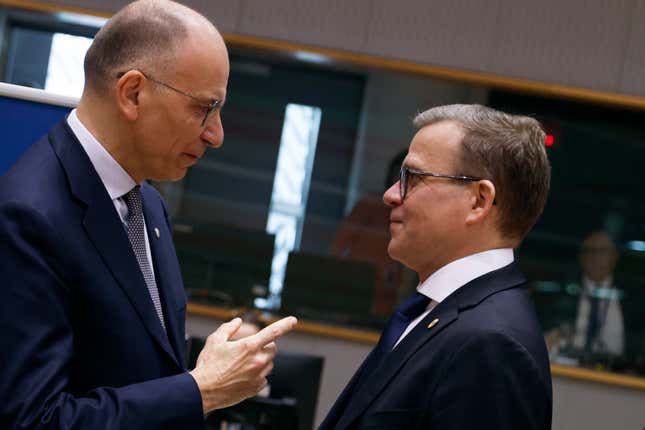
BRUSSELS (AP) — European Union leaders on Thursday debated a new “European Competitiveness Deal” aimed at helping the 27-nation bloc close the economic production gap with Chinese and American rivals amid fears the region's industries will otherwise be left behind for good.
In a volatile geopolitical landscape redefined by the ongoing war between Russia and Ukraine and increasing tensions in the Middle East that create new economic challenges, EU leaders believe there is an urgent need for action.
China, the U.S. and the European Union are the three largest economies in the world, but the EU's share has diminished over the past 30 years. Europe is now feeling pressure amid U.S. and Chinese efforts to support investment in domestic production through subsidies and tax breaks, particularly in renewable energy and green technology.
Before the summit in Brussels, the former president of the European Central Bank, Mario Draghi, said the EU did not pay enough attention to “external competitiveness as a serious policy question” and insisted Europe's biggest economic rivals “are no longer playing by the rules.”
"In the face of a new geopolitical reality and increasingly complex challenges, the European Union is committed to acting decisively to ensure its long-term competitiveness, prosperity and leadership on the global stage and to strengthen its strategic sovereignty,” leaders agreed as their summit in Brussels concluded.
Leaders heard a proposal for an EU-wide effort to subsidize industrial companies in response to the Biden administration’s support for investment in environmentally friendly technology through the Inflation Reduction Act, and to China’s subsidies for electric cars and solar panels.
The proposals, contained in a report from former Italian Prime Minister Enrico Letta, are in response to widespread concern that U.S. subsidies, which favor domestic production in the U.S., are drawing investment from Europe and threatening the loss of industrial jobs on the continent.
“Competitiveness means prosperity for our citizens,” Letta said. “We’re in danger of falling out of touch. There is no time to waste. The gap between the European Union and the U.S. in terms of economic performances is becoming bigger and bigger.”
According to his report, gross domestic product per capita in the U.S. increased by almost 60% from 1993 to 2022, while in Europe the increase was less than 30%.
Draghi said the EU lacks a clear strategy to answer the challenges proposed by Chinese and American rivals in key industries.
“Today we invest less in digital and advanced technologies than the U.S. and China, including for defense, and we only have four global European tech players among the top 50 worldwide,” he said. “We are lacking a strategy for how to shield our traditional industries from an unlevel global playing field caused by asymmetries in regulations, subsidies and trade policies.”
EU rules restrict member governments’ aid to companies to avoid distorting business competition across the 27-member union’s free trade zone. One solution, Letta proposed, is to require countries to use a chunk of such aid for EU-wide projects instead of purely national ones.
The report also calls for better integrating the bloc’s financial markets so companies can raise money for new renewable energy projects from stock, bond and venture capital investors instead of relying mostly on bank lending. That is a longstanding idea that has progressed slowly. Letta’s ideas would be taken up only after this year’s EU parliament elections and the appointment of a new executive commission.
“There is a need for more investment,” said European Council President Charles Michel, who chairs EU summits. "What is fundamental is to act in order to put in place the capital markets union. And also to increase the capacities of the European Investment Bank to invest in strategic sectors.”
Creating more broad-based financial markets would channel European citizens' “billions of euros” in savings as a tool to invest in strategic sectors within the bloc.
“Today, there’s a paradox," he said. “A substantial part of these savings leaves the European Union and is not mobilized to support the economic base, to support innovation, to support the technological base.”
French President Emmanuel Macron backed Michel's statement and rued the fact that those savings end up in the U.S. rather than boosting the bloc.
“Europe has more savings than the United States of America,” Macron said. “And every year, around 300 billion euros of these savings go to finance the American economy.”
___
AP Business Writer David McHugh in Frankfurt, Germany, contributed to this report.